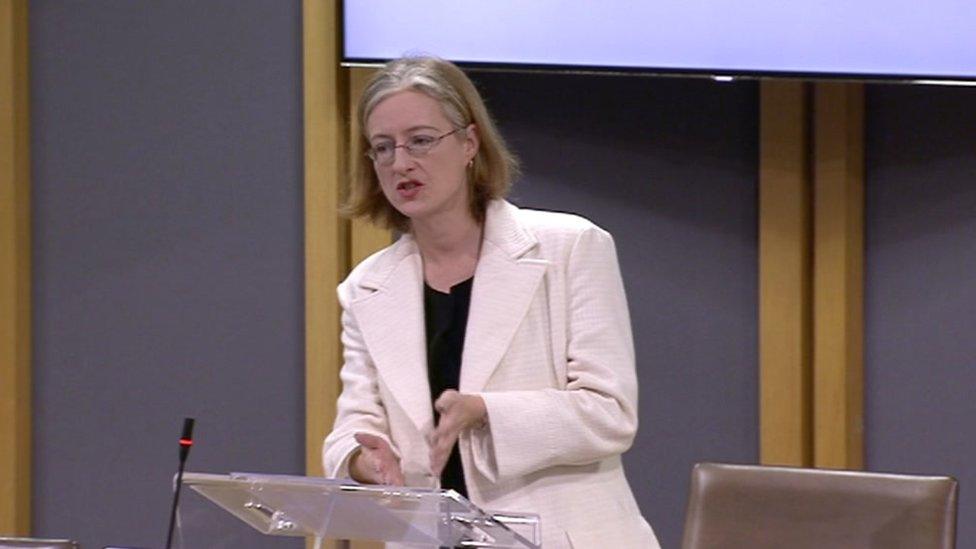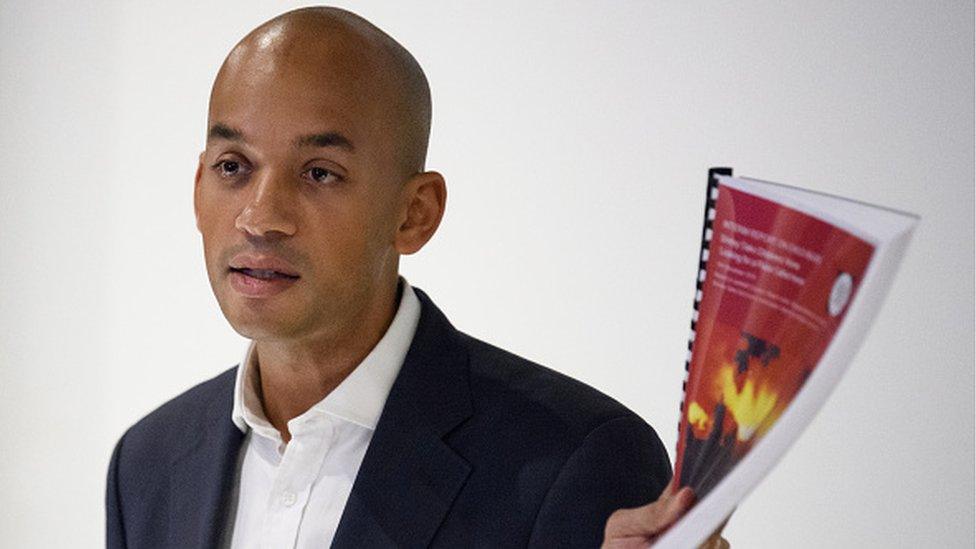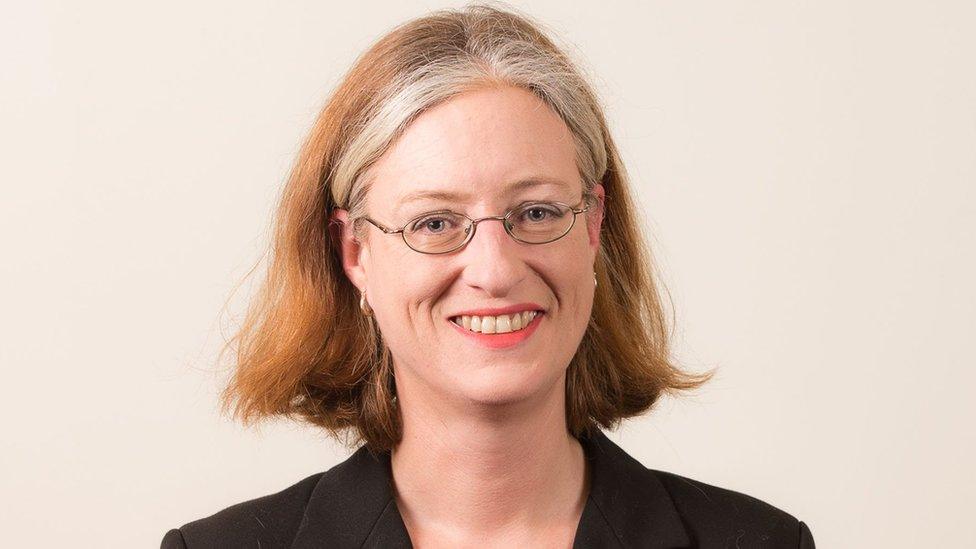UKIP AM Michelle Brown banned from Senedd over racial slur
- Published

Michelle Brown had been judged to have brought the assembly into disrepute
UKIP's Michelle Brown has been excluded from the Welsh Assembly without pay for a week over a racial slur she used to describe a Labour MP.
Members of the standards committee said the North Wales AM's comment about Chuka Umunna in a private phone call brought the assembly into disrepute.
But UKIP leader Neil Hamilton accused AMs of seeking to police each other's private lives.
Ms Brown was not in the Senedd when AMs voted 38 to three in favour of the ban.
Speaking to radio station LBC in response to the decision, Mr Umunna said Michelle Brown "deserves the punishment".
"I don't think she should be in public life - somebody who holds those kind of views. A sanction has been imposed, and good," he added.
Labour, Plaid and Tory AMs voted for the exclusion, but while two UKIP AMs voted against one of the group - Caroline Jones - abstained.
Ms Brown called the Labour MP for Streatham a "coconut" in a phone call in May 2016 to Nigel Williams, who was her senior adviser at the time.
The slur was preceded by an expletive.
Ms Brown apologised for any offence caused. She argued the term was not racist but lost an appeal.
It is the first time the assembly has punished an AM in such a way.
Neil Hamilton says AMs do not realise they are not entitled to a private life under their code of conduct
The comment came to light after Mr Williams had released a recording of the phone call to the Daily Post newspaper last summer, prompting complaints to the standards commissioner Sir Roderick Evans by the assembly Labour group of AMs.
Following a critical report by Sir Roderick, the assembly's standards committee - including its UKIP member Gareth Bennett - recommended Ms Brown be excluded.
On behalf of the committee, its temporary chairman Paul Davies told the Senedd: "This was the first time the committee has recommended a sanction like this, and it was not a decision we took lightly."
The Conservative member said the committee reminded AMs the code of conduct "was a 24/7 code" and should be adhered to at all times.
Leanne Wood said Michelle Brown cannot "safely" represent people of colour in North Wales
Plaid Cymru leader Leanne Wood had asked: "How can a member of this assembly who has been found to be racist safely represent people of colour in her region? The answer is she can't."
Amid heated exchanges, Mr Hamilton said very few other institutions around the world sought to exclude members for words used outside their chambers.
He said Mr Davies's comments were "a startling and sinister development that the assembly seeks the right to police the private lives of assembly members".
The UKIP group leader said he did not seek to defend the use of the word "coconut", but questioned whether it was "any worse" than Ms Wood "falsely describing me as a holocaust denier".
Independent AM Neil McEvoy complained of "virtue signalling", highlighting that the comments were made in private.
Mr McEvoy, who also voted against the exclusion, said: "We have a decision for deciding who should and should not be an Assembly Member, and that's called an election."
"Are you, therefore, suggesting that she's only guilty because she was caught?" Plaid AM and standards committee member Llyr Gruffydd asked Mr McEvoy, who did not answer the question.
The UKIP Wales leader had been rebuked by the deputy presiding officer earlier in proceedings for distributing leaflets to AMs' desks in the Senedd ahead of his contribution.

Michelle Brown had used a racial slur to describe Chuka Umunna in a private phone-call
Mr Hamilton's objection came despite the fact that the standards committee's UKIP member Gareth Bennett had agreed with the decision to expel.
Later, Mr Hamilton told BBC Wales: "Gareth wouldn't have voted for it, except that in order to secure his agreement they reduced the penalty from two weeks... to one week.
"It's not to say that he agrees with the desirability of acting in this way as an assembly."
A spokesman for Mr Bennett said UKIP was a "broad church".
"A consensus view was reached on the standards committee that Gareth was happy with," he said.
The committee's report said "coconut" was a "term of racial abuse, and as such utterly unacceptable".
The commissioner's investigation found the use of the term fell "below the standard of conduct required of assembly members to maintain and strengthen the public's trust and confidence".
Ms Brown denied breaching the code of conduct, claiming the term was not racist and she had been was making a "socio-political point".
Mr Hamilton conceded to the standards committee the term was a form of "racial abuse" but said it was "at the lowest level of severity".
Following the decision, which was leaked to BBC Wales in February, Ms Brown appealed, but a former high court judge threw the case out.
The process, which had to be conducted by a senior independent legal professional with experience in undertaking written appeals, cost the assembly £2,700.
A spokesman for Ms Brown had claimed the first they heard of the appeal decision was through a phone call from the BBC, but that was denied by the assembly commission.
Ms Brown will now be unpaid and banned from proceedings in the Senedd until next Thursday.
- Published2 February 2018

- Published18 April 2018

- Published22 July 2017
